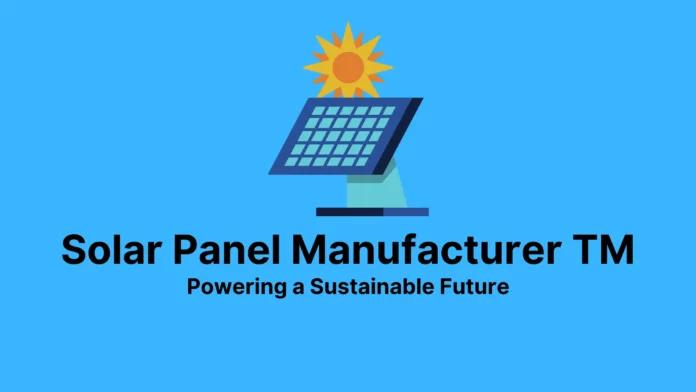In today’s world, our energy needs are growing, and we’re looking for cleaner options. Solar power is one such solution. In this article, we’ll explore how solar panels are made, with a special look at Solar Panel Manufacturer TM, a company known for its innovative work. Let’s see how they’re shaping the future of energy.
What is a Solar Panel Manufacturer TM?
Solar Panel Manufacturer TM is a well-known company that makes and sells solar panels. Whether you need solar panels for your home, RV, or business, choosing a reliable manufacturer like them is important.
Using solar energy is a great way to reduce carbon emissions. This clean energy source is generated by capturing sunlight, and solar panels are a key part of this process.
This article will explore how solar panels are made and how Solar Panel Manufacturer TM contributes to the industry. We’ll also discuss how these panels turn sunlight into usable energy.
The History of Solar Panel Manufacturing
The history of solar energy has two important moments:
- In 1839, a French scientist named Becquerel discovered something important known as the photovoltaic effect. This discovery led to the beginning of the solar energy industry.
- In 1954, Bell Labs in the United States achieved a big breakthrough by creating the first solar cells using a special silicon. This was a major step forward for solar technology.
The Role of Solar Panels
A solar panel, or photovoltaic panel, is a device that takes in sunlight and turns it into electricity. These panels are made of many small solar cells, usually made from special materials.
When these cells get sunlight, they produce a type of electricity called direct current (DC). Then, this DC electricity is changed into alternating current (AC) electricity, which we use to power our homes and businesses.
This article explains how Solar Panel Manufacturer TM‘s solar panels work and why they’re important for clean energy.
What are the Different Types of Solar Panel Manufacturers TM?
In the world of solar panels today, there are different manufacturers, each catering to specific needs:
- For Homes: Some companies specialize in making solar panels for houses. They offer different sizes and designs to match what a home needs.
- For Businesses: Other manufacturers focus on making solar panels for bigger places like offices, factories, and warehouses. These panels can handle more power.
- For Big Projects: Some manufacturers make high-capacity panels When it comes to big projects, like powering whole communities or cities.
- Built Into Buildings: Some experts make solar panels that can be built into parts of buildings, like windows, roofs, and walls. This makes buildings use clean energy and be more energy-efficient.
- Thin and Flexible: You can also find manufacturers that make thin and flexible solar panels. These are great for things like solar-powered gadgets, vehicles, and even clothes.
- Off the Grid: In places where there’s no regular power supply, certain manufacturers make panels that can work all on their own.
- Parts for Solar Panels: Apart from full panels, some manufacturers make the different parts you need for a solar panel system. These include things like controllers, batteries, and mounts.
Knowing these types of manufacturers helps you choose the right solar solution for your specific needs.
Best Solar Panel Manufacturer TM on the Market
Here’s the list of well-known solar panel manufacturers TM:
- Trina Solar
- LONGi Solar
- Jinko Solar
- Canadian Solar
- Panasonic
- First Solar
- SunPower
- ZHCSolar
- LG Solar
- Solaria
- Q CELLS
What Are The Benefits of Choosing A Solar Panel Manufacturer TM?
TM focuses on quality and reliability in their products. Their solar panels, manufactured by Solar Panel Manufacturer TM, are built to handle different weather conditions and provide a steady energy supply.
When you choose TM’s solar panels, you’re getting the latest technology and innovative solutions.
The Manufacturing Process of Solar Panels
Making solar panels involves some important steps:
- Making Silicon Crystals: They turn silica into polycrystalline or monocrystalline silicon. Polysilicon is made by melting and solidifying it, while monocrystalline silicon is grown as a single crystal.
- Cutting Silicon Crystals: Then, they carefully cut the silicon crystals into thin pieces, shape them, and make sure they’re all the same size.
- Adding a Coating: They put a special coating on the silicon pieces to help them absorb sunlight better and then let it dry.
- Creating Special Materials: They make P-type and N-type materials on the surface of the silicon pieces by exposing them to special chemicals.
- Putting Solar Cells Together: These special pieces are then assembled into solar cells, and they add wires to make them work.
- Adding Silver Paste: They put a special layer of silver paste on top of the solar cells to make sure the electricity flows well.
- Protecting the Solar Cells: Finally, they protect the solar cells by adding a cover layer made of glass or plastic and a support structure. This makes the complete solar panel.
Knowing these steps helps you understand how solar panels are made and how they work to turn sunlight into electricity.
The Future of Solar Panel Manufacturing
Let’s look ahead to the promising future of solar panels:
- Getting Better: Solar panels are becoming more efficient at turning sunlight into electricity, thanks to ongoing technological improvements. Scientists are developing advanced types of solar panels like chalcogenide solar cells and quantum dot solar cells. These new panels work better and are becoming more affordable, making solar energy accessible to more people.
- Expanding Uses: Solar panels won’t be limited to just generating electricity or sitting on rooftops. As technology keeps advancing and costs go down, we’ll see solar panels used in more places. Imagine them helping to power electric cars, being part of aeroplanes, or even becoming a part of buildings. This means cleaner and more sustainable energy for many different things.
Understanding these changes, driven by innovations from Solar Panel Manufacturer TM, helps us make smart choices about using solar panels in our daily lives, making the world a cleaner and greener place.
The Role of Solar Panel Manufacturers in the Global Economy
In the world of energy, clean energy is getting more attention because we’re realizing we have big energy challenges.
One important part of clean energy is the photovoltaic (PV) industry. It’s helping us move toward cleaner and more sustainable energy sources.
Let’s see why the PV industry matters:
1. Making Power: The PV industry is all about making clean energy. It uses solar energy to create solar panels that turn sunlight into electricity.
This not only makes power but also reduces the pollution that comes from burning fossil fuels, which is better for the environment.
2. Helping the Planet: The PV industry greatly supports sustainability. This means it’s all about using resources that don’t harm the environment. PV provides a source of energy that’s renewable and good for the Earth.
It also helps local economies, makes energy more secure, and fights problems like poverty. Plus, the PV manufacturing industry creates jobs and helps local communities grow in a sustainable way.
3. A New Way to Live: The PV industry isn’t just a business; it’s a way of living. People and communities can use solar panels on their buildings and lights to turn sunlight into electricity. This is a practical way to use clean and sustainable energy.
Understanding the PV industry helps us make smart choices, embrace clean energy, and join the global effort to use energy that’s better for the planet.
The Impact of Solar Panel Manufacturing on Jobs And The Environment
Solar cells are a key part of clean energy, but making them involves some chemicals and environmental considerations. Here’s the basics:
Chemicals Used: When we make solar cells, we use chemicals like HF, hydrochloric acid, isopropyl alcohol, hydrogen peroxide, and sometimes ammonia. These chemicals are important for the process.
Environmental Impact: Unfortunately, making solar cells can release waste gases that might harm the environment. We need to be aware of this as we work towards cleaner energy.
Why It Matters: Knowing this stuff is important for anyone interested in solar power. It helps us make smart choices and pushes the solar industry to be more eco-friendly.
As we look to a greener future with solar energy, it’s good to understand how it all works and how we can make it even better for the planet.
The Different Types of Solar Panels
When it comes to solar panels, there are three main types to know about monocrystalline, polycrystalline, and thin-film. These are the ones you’ll encounter most often, but there are some others too. Let’s take a closer look:
Monocrystalline Solar Panels: These are known for their efficiency and sleek appearance. They’re really good at turning sunlight into electricity. They can be a bit more expensive, but they usually make up for it with their performance and long lifespan.
Polycrystalline Solar Panels: These are a popular choice because they’re cost-effective. They might not be as efficient as monocrystalline panels, but they work well for many homes and businesses.
Thin-Film Solar Panels: These panels are flexible and lightweight, which makes them great for different uses. They’re not as efficient as crystalline panels, but they’re versatile and can be used in unique ways. Plus, they keep getting better over time.
There are also some other types of solar panels you might come across, like bifacial panels, PERC panels, and CIGS panels. Each has its own features and is good for specific situations.
Understanding these different solar panel options helps you choose the right one for your needs, budget, and project.
The Factors to Consider When Choosing a Solar Panel Manufacturer TM
When you’re in the market for solar panels, it’s essential to consider a few key factors to make the right choice for your energy needs. Here’s a straightforward guide to help you through the process:
1. Efficiency Matters: Look for efficient solar panels. These panels can turn more sunlight into electricity, giving you more energy and value for your investment.
2. Warranty Assurance: Pay attention to the warranty offered by the manufacturer. A longer warranty often means the manufacturer has confidence in their panels’ durability and performance.
3. Budget Considerations: Solar panels come in different price ranges. While some pricier panels might be more efficient, finding a balance that fits your budget while meeting your energy needs is crucial.
4. Manufacturer Reputation: Choose a trusted manufacturer known for producing reliable panels. Reading reviews and seeking feedback from other users can help you make an informed decision.
5. Installation and Maintenance: Proper installation and regular maintenance are vital for your panel’s performance. Consider hiring certified professionals and following maintenance guidelines to ensure your panels last and work efficiently.
6. Real-Life Success Stories: Learn from successful solar panel implementations in various settings. These stories show how solar energy benefits homes, businesses, and communities.
7. Busting Solar Myths: Don’t be misled by common myths about solar energy, like it is too expensive or ineffective on cloudy days. Solar power is becoming more affordable, and panels can still generate electricity even when it’s overcast.
8. Government Support: Check for government incentives and policies that encourage solar energy adoption in your area. These can include tax credits and rebates that reduce your initial investment in solar panels.
9. Right Panel Size: Consider the size of your roof or available space for installation. Larger panels generate more electricity but may cost more and take up more room. Match the panel size to your space and energy needs.
10. Wattage Matters: Look at the wattage of solar panels, which tells you how much energy they can produce. Higher-wattage panels are pricier but can meet high energy demands.
11. Long-Term Investment: Remember that solar panels are a long-term investment. They have a long lifespan, allowing you to generate electricity for many years and save money in the long run.
12. A Greener Future: Choosing solar panels isn’t just about your immediate needs; it’s about contributing to a cleaner, more sustainable future. Solar energy reduces your carbon footprint and benefits the environment for generations to come.
With this guide, you can confidently select solar panels that suit your needs, save you money, and help protect your planet.
FAQs
Q: Who is the No one solar panel manufacturer in India?
A: Adani Solar, the solar PV manufacturing arm of the Adani Group, holds the title of “India’s largest vertically integrated cell and module manufacturer.”
Q: Who is the largest manufacturer of solar panels globally?
A: Longi stands as the world’s largest manufacturer of solar modules.
Q: Who is the fastest-growing solar company in the United States?
A: SOAR Energy is recognized as the #1 fastest-growing solar company in the United States, dedicated to empowering homeowners with solar knowledge and resources for a sustainable future.
Q: Which country owns the most solar panels?
A: As of 2022, China leads the world in solar power capacity, followed by the United States and Japan.
Recommendation
What is PCR Packaging? Everything You Need to Know
Using PCR Materials Benefits For Our Planet and Your Company
Conclusion
In conclusion, solar power offers a vital solution to our escalating energy needs while reducing our environmental footprint. Solar Panel Manufacturer TM plays a pivotal role in advancing this technology.
From its historical roots to today’s cutting-edge innovations, solar panels have evolved into a versatile, efficient, and accessible energy source. As we look to the future, increased efficiency and diverse applications promise a greener world.
Factors like warranty, budget, and government incentives influence panel selection. By embracing solar energy, we contribute to a sustainable future, benefitting our planet and future generations.




